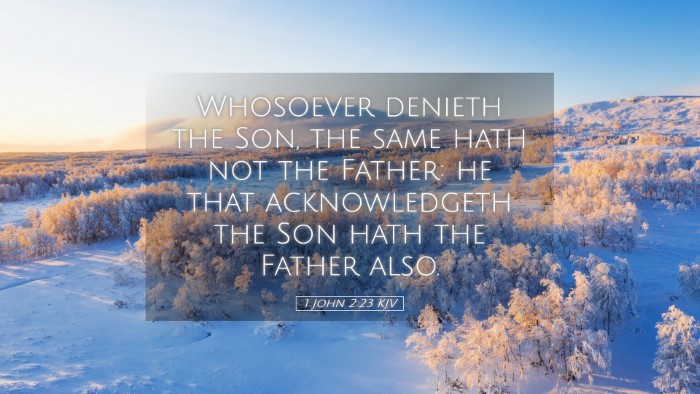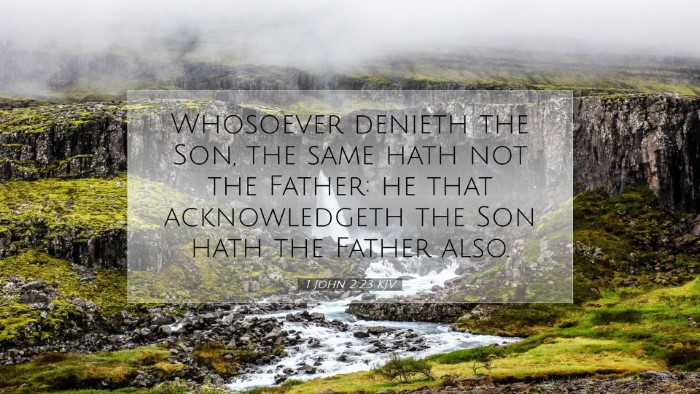Commentary on 1 John 2:23
Verse: 1 John 2:23 (KJV)
"Whosoever denieth the Son, the same hath not the Father: (but) he that acknowledgeth the Son hath the Father also."
Introduction
This passage serves as a crucial theological foundation reflecting the nature of the relationship between the Son and the Father. The Apostle John emphasizes the essentiality of acknowledging the Son—Jesus Christ—as fundamental to the believer's relationship with God the Father. Within this verse, we see a clear theological declaration on both denial and acknowledgment. Such insights not only guide personal faith but also frame broader discussions for theological reflection and pastoral teaching.
Exegesis and Interpretation
Denial of the Son and Its Consequence
Matthew Henry comments on the seriousness of denying the Son. He emphasizes that to deny the incarnate Christ is to cut oneself off from the knowledge and experience of the Father. The denial carries an eternal implication, demonstrating that the relationship with God is through Jesus. Albert Barnes notes that the denial does not simply refer to a verbal denial but also includes a lifestyle that contradicts the acknowledgment of Christ’s nature and His role as mediator.
Acknowledgment of the Son
In contrast, Adam Clarke highlights the importance of acknowledging Christ, indicating a relational and experiential understanding. To acknowledge the Son is to have a recognition that influences both belief and practice. Barnes remarks that this acknowledgment implies faith in Christ’s divine sonship and salvific work, establishing a direct connection to the Father.
Theological Significance
This verse encapsulates critical theological truths about the Triune God. It reflects the necessity of understanding that knowing God the Father is intrinsically linked to a recognition of Jesus Christ as the Son. The implications of this truth are far-reaching for Christian doctrine and life, as seen in various commentaries.
Cross-References and Connections
1 John 2:23 synergizes with other scriptural references that discuss the relationship between the Father and the Son. For instance:
- John 14:6: Christ states He is "the way, the truth, and the life," revealing that no one comes to the Father except through Him.
- John 5:23: Here, Jesus asserts that honor given to the Son is equal to honor given to the Father.
- John 10:30: Jesus declares, "I and my Father are one," illustrating the unity that exists within the Godhead.
These verses corroborate John’s assertion that acknowledging the Son is vital for true communion with God. The interconnectedness of these scriptures reveals an underlying biblical theme that challenges believers to consider the importance of Christ's identity and their response to it.
Practical Applications
Understanding 1 John 2:23 invites several practical applications for believers, particularly pastoral leaders and theologians:
- Affirmation of Faith: Pastors are encouraged to instill in their congregations an unwavering acknowledgment of Christ's divinity and the ramifications of that belief on their relationship with God.
- Evangelistic Urgency: There exists a missional clarity that arises from this verse; those who do not know the Son are void of the Father’s transformative grace, urgent for outreach to those in denial.
- Discipleship Focus: In discipleship, there's a necessity for teaching that emphasizes both knowledge and experiential acknowledgment of Christ in the lives of believers.
In practical terms, this scripture emphasizes the need for genuine acknowledgment which then manifests in loving obedience, informed worship, and active discipleship. The pastoral task is to bring this dynamic into church life, ensuring that congregants understand the richness of their relationship with God through Christ.
Historical Context
The context in which 1 John was written was essential for understanding John’s intent. The early church encountered various heresies that threatened the integrity of Christ’s nature. Gnosticism, for example, argued against the full incarnation of Christ. John’s declaration in 2:23 serves not only as a defense against such heresies but as a rallying call for believers to understand the bedrock of their faith. The historical conflicts faced by the early church underscore the importance of maintaining sound doctrine regarding Christ’s identity as essential.
Conclusion
In 1 John 2:23, we find a profound statement that reverberates through both history and contemporary faith. The relationship between acknowledgment of the Son and the knowledge of the Father is of supreme importance. Denying the Son leads to spiritual emptiness, while acknowledging Him opens the door to a relationship with the Creator. This verse not only serves as a theological cornerstone but also guides practical Christian living and community life. As we engage with this text, may we strive to deepen our acknowledgment of Christ and embrace the fullness of relationship with the Father He reveals.


